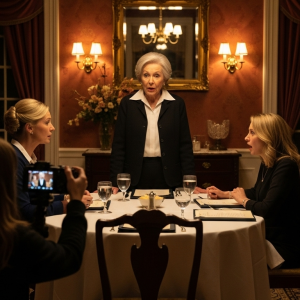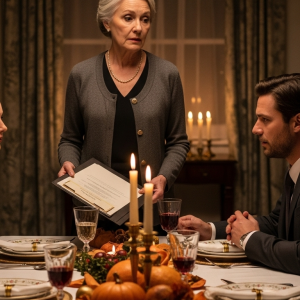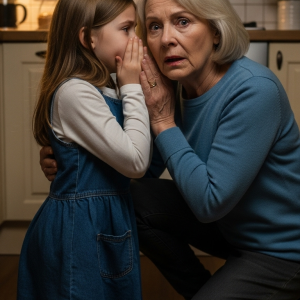I stood behind a marble pillar at my son’s wedding reception, listening to my new daughter-in-law tell her friend she was going to have me committed to steal my beach house. I walked straight to the bar, ordered a double whiskey, and smiled at everyone like the perfect mother of the groom. What happened next changed everything.
The grand ballroom at the Riverside Country Club looked like something out of a magazine—white roses, crystal chandeliers, and my son, David, looking handsome in his navy tuxedo. At sixty-three, I should have been the happiest mother alive. Instead, I was eavesdropping.
“The plan is simple,” Jessica whispered to her maid of honor, champagne flute in hand. “We give it six months, maybe a year. Document everything. When she forgets names, when she repeats stories, when she seems confused… then we have her evaluated.”
“Isn’t that a bit harsh?” the friend asked.
Jessica laughed, a sound like ice cubes clinking in a glass. “She’s sixty-three and all alone in that big house. It’s mercy, really. Plus, David deserves that beach house after everything she’s put him through.”
My blood turned to ice. The beach house. The one my late husband, Robert, and I bought thirty years ago. The place where David learned to surf, where Robert proposed to me. I stepped back from the pillar, my heart hammering against my ribs. Jessica caught my eye across the room and waved, a perfect, predatory smile plastered on her face. I waved back. Because that’s what mothers do. We smile and pretend everything is wonderful.
David appeared beside me. “Mom, you look pale. You feeling okay?”
“Just tired, sweetheart,” I said. “It’s been a long day.”
“Well, Jessica wants to talk to you about Christmas plans,” he said, squeezing my shoulder before heading back to his bride. I watched him go, remembering the little boy who promised he’d always take care of his mama. That boy was gone. In his place stood a man who defended the woman he’d known for eight months over the mother who’d raised him.
I walked to the bar. “Double whiskey,” I told the bartender.
“Rough day?” he asked with a knowing look.
“You could say that,” I replied, feeling the burn. “Tell me, do you believe in karma?”
“In my line of work, ma’am,” he chuckled, “I’ve seen enough to believe in everything.”
“Good answer,” I said, finishing my drink. “Because I have a feeling it’s about to make a comeback.”
Three months earlier, David had brought Jessica home for the first time. She was twenty-eight, blonde, and armed with a smile that could sell ice to penguins. Even then, something felt off—too polished, too rehearsed, like she had studied for an exam on “How to Impress a Future Mother-in-Law.”
She told me she used to work in social services, “helping families navigate difficult situations.” I should have paid more attention to that red flag. Over the next few weeks, she became a constant presence, rearranging my kitchen to be “more efficient” and offering unsolicited advice on my finances.
“You know, Maggie,” she’d said one evening, “David mentioned you handle all your own investments. That must be so stressful at your age. Maybe David could help take some of that burden off your shoulders.” David, who’d asked me for money three times in the past year to cover his credit card debt.
The worst part was watching my son change. The man who used to call me every Sunday was suddenly “too busy.” “Jessica thinks we spend too much time together,” he’d explained. “She says it’s not healthy for a man my age to be so dependent on his mother.” Dependent, while living rent-free in my pool house for two years. But I bit my tongue.
Soon, they announced they were moving into a house I owned on Maple Street—an investment property I’d been letting David use temporarily. The mortgage payments never started. When I drove by one afternoon, I saw a brand-new BMW in the driveway.
“Jessica needed reliable transportation for her new business,” he’d explained when I called.
“How wonderful,” I’d said. “Speaking of business, when might you start contributing to the mortgage?”
“Look, Mom, we need to talk,” he’d sighed. “Jessica… well, we think you’re being a little controlling with the money stuff. You use the house as leverage. Jessica says that’s not a healthy family dynamic.” Everything was Jessica says now.
That conversation happened on a Tuesday. By Friday, I was sitting in my lawyer’s office. Thomas Hartwell had been our family attorney for fifteen years. “Margaret, are you certain about this?” he asked.
“Absolutely certain,” I replied. “Sell them. Both of them.”
“Both properties? Margaret, the beach house alone is worth over two million.”
“Which is why I want them liquidated properly and discreetly,” I said. “Price them to sell quickly. I want clean, fast transactions.” I thought about Jessica’s laugh as she plotted to have me committed. I thought about David calling me controlling for expecting him to pay his own bills.
“Thomas,” I’d said, “what do you think about people who bite the hand that feeds them?”
“I think they shouldn’t be surprised when the feeding stops,” he’d replied.
“Exactly,” I said. “One more thing. I need you to research someone for me. Jessica Morrison, twenty-eight, former social worker. I want to know everything.”
The call came three weeks after the wedding. David’s voice was tight with panic. “Mom, we need to talk. Now.”
I drove to Maple Street, savoring what I knew would be my last visit to the house as its owner. “We got a notice,” he said without preamble. “The house is being sold. They want us out in thirty days.”
“How strange,” I said innocently. “Who’s selling it?”
“Very funny, Mom. You sold our house.”
“I sold my house,” I corrected him. “There’s a difference.” I pulled the lease agreement from my purse—the one he’d signed and dismissed as a “formality.” “Thirty days’ notice for termination,” I read aloud. “You stopped paying rent after the first month. You bought luxury cars while stiffing me on utilities. You broke the contract.”
He slumped onto Jessica’s pristine white couch. “This isn’t fair, Mom. We’re married now. We need stability.”
“Then get jobs that provide it,” I said. I headed for the door, then paused. “Oh, and David? The beach house is sold, too. In case Jessica was counting on that for her retirement fund.”
The sound of him calling my name followed me all the way to my car.

Jessica called next, her voice stripped of its fake warmth. “You bitter old woman,” she’d spat after I refused to reverse the sales.
Then, she played her next card. “David’s been struggling since you kicked us out,” she’d said, her tone shifting to one of deep concern. “He’s been forgetting things, getting confused. I’m worried about his mental health. I think the whole family needs professional help.”
She was laying the groundwork, building her narrative. Confused son, isolated by manipulative mother. She was good, but she’d made one crucial mistake: she’d warned me what was coming.
The intervention happened on a Tuesday. David stood on my porch with Jessica, a woman in scrubs, and a man in a suit. “Mrs. Cooper,” the man began, “I’m Dr. Franklin from Serenity Springs Mental Health Facility. Your family has expressed concerns.”
“We’re here because we love you,” Jessica cooed. “David told Dr. Franklin about the concerning behaviors you’ve been exhibiting.”
“The property sales, Mom,” David mumbled, not meeting my eyes. “Liquidating major assets without any logical reason. That’s not rational behavior.”
I looked at my son, who had cried when I dropped him off at kindergarten, and felt a profound sadness. “David, do you really believe I’m mentally incompetent?”
“I believe you need help, Mom,” he said, his voice cracking. “And I believe Jessica knows how to get it for you.”
“We’re proposing a seventy-two-hour evaluation period,” Dr. Franklin said. “And if I refuse?” I asked. “Your family can petition for an emergency commitment if they believe you’re a danger to yourself or others.”
I looked at the group—Jessica, determined; David, miserable; Dr. Franklin, bored. “Fine,” I said. “Let me pack a bag.” As I threw clothes into a suitcase, I made three phone calls. The first was to my lawyer. The second was to my bank. The third was to someone Jessica didn’t know existed, a police detective who had a very personal interest in her activities.
Serenity Springs was a place where inconvenient people got stored. My evaluator, Dr. Summers, was young enough to be my granddaughter. “Your family is concerned about some recent behavioral changes,” she began.
“My family is concerned about their meal ticket disappearing,” I replied.
“Anger can be a symptom of underlying cognitive issues,” she noted.
“Dr. Summers,” I asked, “have you reviewed Jessica Morrison’s employment history? She used to work in Adult Protective Services, evaluating elderly people for competency. She knows exactly how this system works.” Dr. Summers stopped writing.
Over the next two days, I submitted to their tests, answered their questions, and made a friend. Nurse Angela had seen this movie before. “Pretty girl, older man with money, family members who suddenly develop concerns,” she’d sighed. “Hypothetically,” she’d later advised, “a smart old person would document everything and make sure someone on the outside knew exactly what was happening.”
On my third day, Angela brought me a legal mail envelope. Inside was everything my lawyer had promised: Jessica’s complete employment history, including two civil suits for elder abuse that had been quietly settled, and a criminal conviction for fraud in Nevada. There was also a note from Detective Morrison. Mrs. Cooper, Jessica is my half-sister. I’ve been trying to build a case against her for years. Your situation might be what we need. Call me when you get out.
The next morning, Dr. Summers delivered the news with obvious reluctance. “Mrs. Cooper, I see no evidence of cognitive impairment that would require continued treatment.” I was free to go.
David and Jessica picked me up, their faces a mixture of disappointment and feigned relief. “Maggie, I think we all learned something,” Jessica said in the car. “Communication is so important. Maybe we could have dinner tonight? Start fresh.”
“That sounds lovely,” I said. “Why don’t you both come to my new place around seven?”
They dropped me off at my new, smaller condo, then I made my phone calls. The first was to Detective Morrison. “I’m out,” I said. “How about we meet right now? I’ll bring backup.” The second was to my lawyer. “Execute everything,” I told him.
At 6:45 p.m., Detective Morrison and two other officers pulled into my driveway in unmarked cars. At 7:00, David and Jessica knocked on my door. “Come in,” I called. “There are some people I’d like you to meet.”
The look on Jessica’s face when she saw Detective Morrison was worth every penny this had cost me. “Danny?” she breathed. “What are you doing here?”
“My job,” he replied. “Mrs. Cooper, would you like to tell them, or should I?”
“I’ll handle it,” I said, turning to my son. “Jessica has done this before, David. Three times that we know of. She targets men with wealthy family members, manipulates them, and orchestrates mental health crises to gain control of their assets.” David stared at Jessica, whose face had gone white. “The engagement ring she’s wearing,” I added, “belonged to her last victim. She kept it as a trophy.”
“Jessica Morrison,” Detective Morrison said, stepping forward, “you’re under arrest for conspiracy to commit fraud, falsifying medical documentation, and elder abuse.”
As they read her rights, Jessica dropped the act. “You think you’ve won?” she snarled at me. “Your son will never forgive you for this.”
“No,” I said quietly. “I’ve saved his life. And my own.”
After the police left, David sat silently, a broken man. I forgave him, eventually. Not because he deserved it, but because mothers don’t give up on their children, even when their children give up on them. Jessica was sentenced to five years in federal prison.
Six months later, I sat on the deck of my new beachfront condo, watching the sunset. David had a new job and was in therapy, slowly rebuilding his life. Jessica’s other victims were finally getting justice. My phone buzzed. A text from a woman who had read about my story. I think my stepmother might be doing to my father what Jessica did to you. Could we talk?
I smiled and typed back. Of course. When would you like to meet? Jessica had seen an easy target. She’d been half-right. I was a widow who loved my son. But I wasn’t lonely, and I definitely wasn’t easy. Loving your children doesn’t mean accepting abuse. Being sixty-three doesn’t mean being helpless. Some lessons are worth learning, no matter how much they cost.




